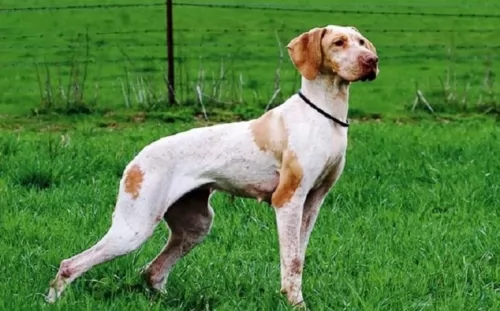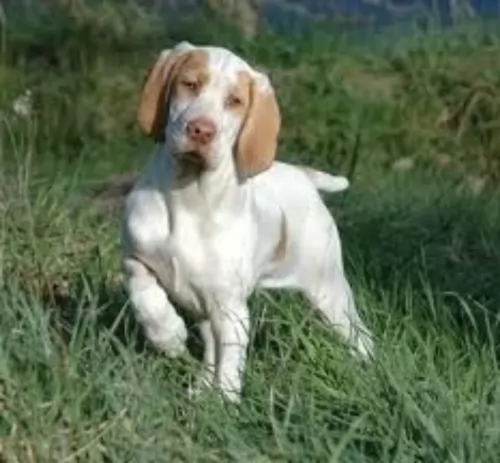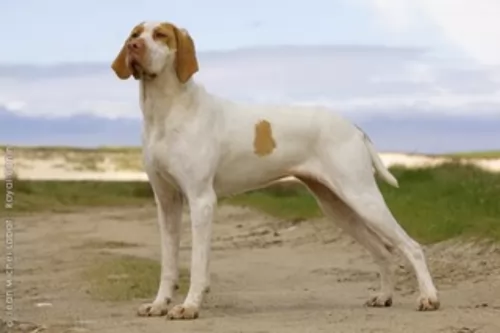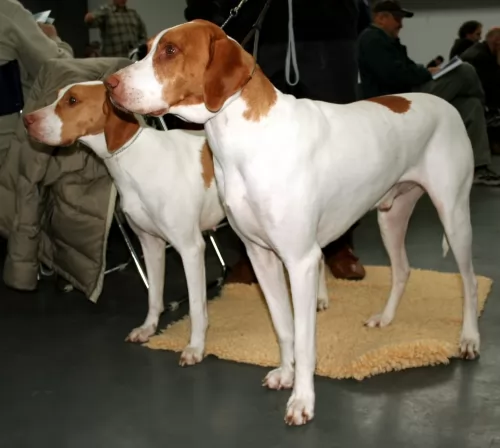 Petzlover
Petzlover Argentine Dogo is originated from Argentina but Ariege Pointer is originated from France. Both Argentine Dogo and Ariege Pointer are having almost same height. Argentine Dogo may weigh 15 kg / 34 pounds more than Ariege Pointer. Argentine Dogo may live 3 years less than Ariege Pointer. Both Argentine Dogo and Ariege Pointer has same litter size. Both Argentine Dogo and Ariege Pointer requires Low Maintenance.
Argentine Dogo is originated from Argentina but Ariege Pointer is originated from France. Both Argentine Dogo and Ariege Pointer are having almost same height. Argentine Dogo may weigh 15 kg / 34 pounds more than Ariege Pointer. Argentine Dogo may live 3 years less than Ariege Pointer. Both Argentine Dogo and Ariege Pointer has same litter size. Both Argentine Dogo and Ariege Pointer requires Low Maintenance.
 Known also as the Argentinian Mastiff, this large dog breed from Argentina is a descendant of the extinct Fighting Dog of Cordoba. People were looking for a fearless, companionable dog, and a man, Martinez from Argentina, began a selective breeding program to get a breed that wasn’t essentially geared to fighting.
Known also as the Argentinian Mastiff, this large dog breed from Argentina is a descendant of the extinct Fighting Dog of Cordoba. People were looking for a fearless, companionable dog, and a man, Martinez from Argentina, began a selective breeding program to get a breed that wasn’t essentially geared to fighting.
A number of breeds were mixed to achieve the desired characteristics in the Argentine Dogo breed.
It is unfortunate that the dog has been used for fighting and that it comes across as a dangerous dog so that today it is banned in several countries.
 The Ariege Pointer is a French hunting dog, coming from the Ariegeois region of France.
The Ariege Pointer is a French hunting dog, coming from the Ariegeois region of France.
Known as the Ariege Pointing Dog, French Pointer or Braque de l’Ariege, these dogs came from the old French Braque dogs that were crossed with the orange and white Southern Braques.
It was in 1990 that a team of breeders decided to devote themselves to the breed’s survival. The Braque de l’Ariege was recognized by the United Kennel Club in 2006.
 The Argentine Dogo is a striking looking dog, large, muscular and powerful looking. He stands at about 60 – 68cm and weighs about 35 – 45kg.
The Argentine Dogo is a striking looking dog, large, muscular and powerful looking. He stands at about 60 – 68cm and weighs about 35 – 45kg.
He has a pure white coat. The coat is short and smooth. The ears are high set and most times cropped and erect.The Dogo’s tail is long and hangs naturally.
The Argentine Dogo is a companion dog today who can be loving and loyal towards his human family. He is a strong willed dog with a distrust of strangers and other animals.
He will most certainly require training and socialization if you want him to behave well among people and animals. With proper training and socialization, he can make a good family pet.
 The Ariege Pointer has always been a dog kept essentially for hunting and not as a companion dog. He stands between 55 – 67cm and weighs 25 – 30kg.
The Ariege Pointer has always been a dog kept essentially for hunting and not as a companion dog. He stands between 55 – 67cm and weighs 25 – 30kg.
He is an attractive looking dog with quite a large head while the body is sleek and slender to look at. The ears are quite large and are floppy while the tail is traditionally docked to give him that distinctive look. These days the tail is often left long and hangs downwards.
The coat is short, single and rough and is white with tan or orange patches. The coat can also be speckled or ticked.
The Ariege Pointer is a hunting dog who is friendly towards strangers and therefore won’t make a particularly good watchdog.
These dog are lively, independent and good natured and they make excellent companion dogs. They are fairly docile and and get on well with children and pets in the home. Just like with any other dog, they need to be trained and socialized early.
 This big, muscular white dog with his short white coat was once a hunting dog so he is active and energetic. He is also intelligent and courageous, loving his human family and wanting to protect them being a strong characteristic of his.
This big, muscular white dog with his short white coat was once a hunting dog so he is active and energetic. He is also intelligent and courageous, loving his human family and wanting to protect them being a strong characteristic of his.
The Argentine Dogo is social, strong, loyal and devoted and just wants to be part of his human family and all their activities. It is important that he is trained and socialized at an early age because then he is obedient and relaxed around people and pets in the home.
 The Ariege Pointer has always been an excellent pointing- and hunting dog. When it comes to being a family pet, he puts his hunting skills aside and becomes a loyal, loving, friendly pet.
The Ariege Pointer has always been an excellent pointing- and hunting dog. When it comes to being a family pet, he puts his hunting skills aside and becomes a loyal, loving, friendly pet.
They are considered to be rare dogs, and were at one time bordering on extinction. Those who have owned one of these hunting dogs will be glad to know that they are no longer considered endangered. They’re not your friendly, social kind of dog that you find in other dog breeds, but with training and socialization he will make a fine companion and family friend.
 The Argentine Dogo can live to be between 10 and 12 years of age if he is looked after well, however about 10% of Argentine Dogos suffer from pigment-related deafness in one or both ears.
The Argentine Dogo can live to be between 10 and 12 years of age if he is looked after well, however about 10% of Argentine Dogos suffer from pigment-related deafness in one or both ears.
A dog can lose it’s hearing because of an ear infection. That is why it is so important to watch your pets ears and make sure that the ears aren’t red and that your pet isn't continually scratching his ears.
The most common cause of congenital deafness with a dog is pigment-related. Dogs with white coats are often affected by deafness and you commonly see deafness in dogs with white pigmented skin because they carry the piebald gene – the white coat and often blue eyes. Without a particular stem cell, the white dog’s body isn’t able to make a special layer of hearing cells.
There is a high rate of hip dysplasia with these dogs and more than 40% of Argentine Dogos have malformed hips. This isn’t a dog ailment to take lightly as it can lead to pain, discomfort and even lameness for your pet.
Skin diseases such as red, itchy allergies are also common with these dogs as well as eye diseases.
 The Ariege Pointer is a working dog breed, used for hunting and retrieving prey. With good care the dog can live to be a good 12 – 15 years of age.
The Ariege Pointer is a working dog breed, used for hunting and retrieving prey. With good care the dog can live to be a good 12 – 15 years of age.
However, with every dog breed there are common dog diseases to watch for. This dog has long floppy ears and these can get damp and will need to be cleaned and dried regularly otherwise the long ears can be prone to infection.
Apart from being prone to health issues such as an ear infection, you want to be aware of very common dog ailments such as hip dysplasia which can cause lameness in your dog.
Whatever illness your dog has, and you see he isn’t acting his usual self, get him to the vet for a check-up and then make sure that all treatment and medication prescribed is adhered to.
 With his short coat, the Argentine Dogo is a low maintenance dog, requiring a good brush twice a week. Its a pure white dog, and wiping him down with a damp cloth can keep his coat looking dazzling white and clean.
With his short coat, the Argentine Dogo is a low maintenance dog, requiring a good brush twice a week. Its a pure white dog, and wiping him down with a damp cloth can keep his coat looking dazzling white and clean.
Grooming your dog like this gives you a good chance to also check your pet for fleas and ticks and to ensure the skin is free from infection or dryness. You will find that he sheds a bit more in the hotter seasons, but during the colder months it will be wise to bring your pet indoors.
Other areas to consistently check with your dog are his nails – to keep them trimmed, to clean his teeth 2 or 3 times a week with proper canine toothbrush and toothpaste and to check his ears for infection.
 Your attractive Ariege Pointer will give birth to 2 – 8 puppies. If you don’t want puppies, then spaying or neutering is excellent and can actually have many health benefits for your pet.
Your attractive Ariege Pointer will give birth to 2 – 8 puppies. If you don’t want puppies, then spaying or neutering is excellent and can actually have many health benefits for your pet.
This dog with its short coat requires very little maintenance, and a good brush twice a week will ensure the coat remains glossy and shiny, giving you the chance to also check for fleas and ticks.
Don’t just assume every dog has bad breath. Bad breath can be indicative of dental disease, and dental problems can cause all kinds of other illnesses within the body. Make sure that while your pet’s teeth are healthy, that you brush them 2 or 3 times a week with special canine toothbrush and toothpaste.
The Ariege Pointer requires regular exercise as it is a lively, energetic dog. He can adapt to life in the city or the country, but ideally he needs a place with a large garden.
Wherever you keep him as a pet, make sure you take him for walks every day and that you play ball- or rope games with him. Ignoring his exercise needs will turn him into a bored, frustrated pet, and that isn’t fair towards him.
Make sure you choose good quality commercially manufactured foods for him. Adding in some home-made food to his kibble such as cooked brown rice, vegetables and chicken will be wonderfully good for him.
Every dog will require some raw meat added into his diet from time to time. Many skin diseases can be treated by adding in raw meat. After all, before dogs were domesticated they lived on raw meat, and including this ingredient back into their diet guarantees to make a remarkable difference in terms of good health.